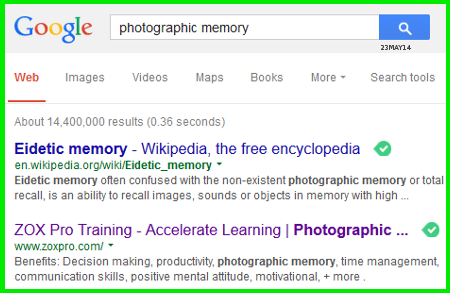


Recalling that President Kennedy was assassinated on Nov.Some examples of semantic memory include: Semantic memory includes things that are common knowledge, such as the names of states, the sounds of letters, the capitals of countries and other basic facts that are not in question. Semantic memory is not connected to personal experience. While most people can tick off the days of the week from the time they are in grade school - which is implicit memory - it takes explicit memory to remember that your mother's birthday is next Wednesday. Declarative memory involves both semantic and episodic memory. While implicit memory requires little if any effort to recall, explicit memory - sometimes referred to as declarative memory - requires a more concerted effort to bring the surface.
#Example of eidetic memory how to
You don't have to delve into your memory to recall how to walk each time you take a step. Procedural memory, which is a subset of implicit memory, is a part of the long-term memory responsible for knowing how to do things, also known as motor skills.
#Example of eidetic memory professional
Musicians and professional athletes are said to have superior ability to form procedural memories. Implicit memory uses past experiences to remember things without thinking about them. Implicit memory is sometimes referred to as unconscious memory or automatic memory. Patients who suffer from short-term memory loss can't remember who walked into the room five minutes before, but can remember their childhood friend from 50 years ago. It is generally believed that five to nine items can be stored in active short-term memory and can be readily recalled. While experts have varying definitions for short-term memory, it is generally described as the recollection of things that happened immediately up to a few days. Memory loss is often associated with aging, but there are a number of things that can trigger short- and long-term memory loss, including injury, medications and witnessing a traumatic event. Again, much of this recall happens without having concentrate on it - particularly with common tasks such as shoe tying - but there are other types of memories that take more effort to bring to the forefront. Then we use the process of retrieval to bring it to the forefront when we need to use it. We are typically not aware of what is in our memory until we need to use that bit of information. That's why someone might be able to recall the stats of a favorite baseball player years after he has retired or where a favorite pair of shoes was purchased. Motivation is also a consideration, in that information relating to something that you have a keen interest in is more likely to be stored in your long-term memory.


 0 kommentar(er)
0 kommentar(er)
